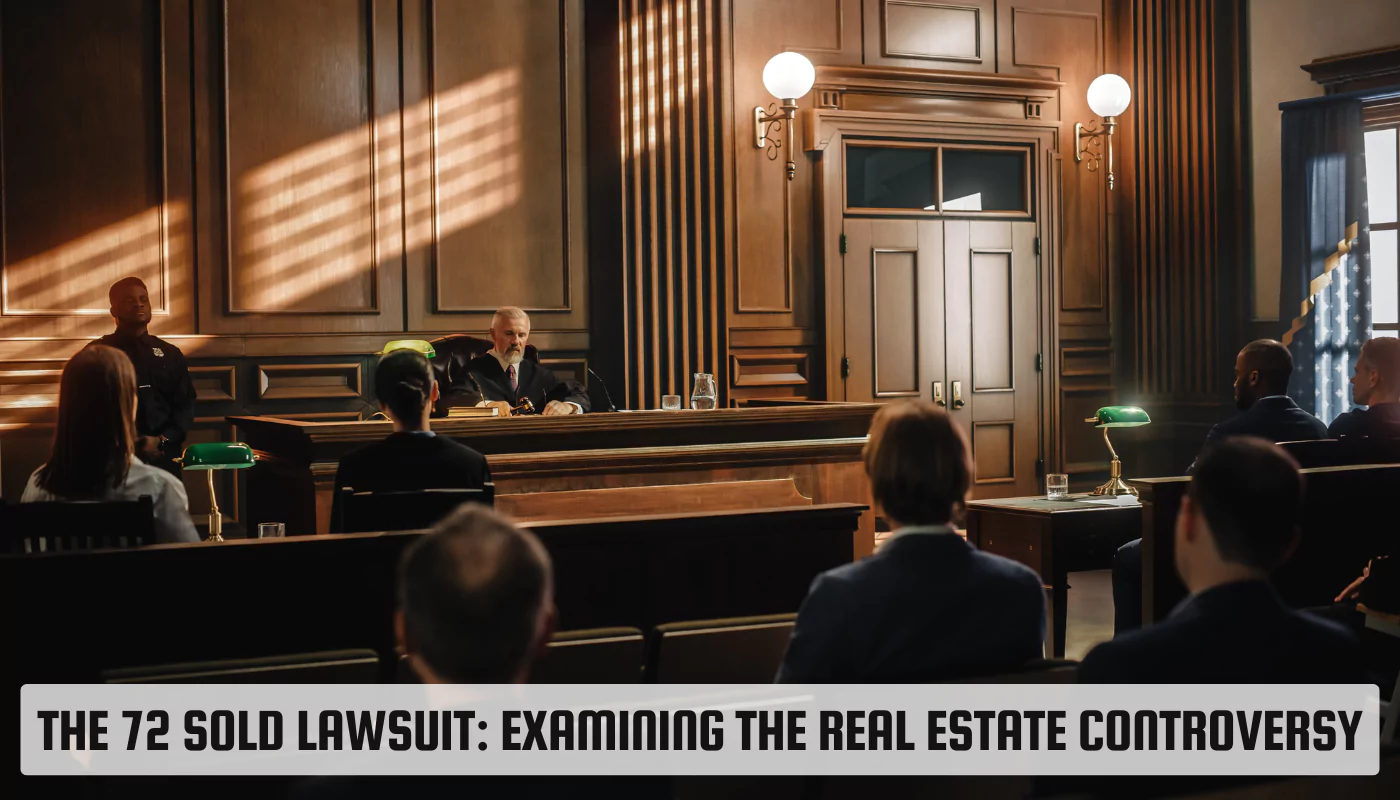The real estate market is rife with innovations, but sometimes these innovations lead to legal challenges. One such case is the 72 Sold lawsuit, which has garnered significant attention. This lawsuit has raised questions about business practices, advertising claims, and consumer protection in the real estate industry.
What is the 72 Sold Lawsuit?
The 72 Sold lawsuit revolves around the business practices of the real estate program “72 Sold,” which promises to sell homes within 72 hours at a premium price. This concept, while appealing to many homeowners, has also attracted scrutiny, leading to legal disputes. The lawsuit typically focuses on allegations of false advertising, deceptive marketing practices, and potential breaches of contract. These legal challenges have implications not only for the company but also for the broader real estate industry.
The Origins of 72 Sold: A Revolutionary Real Estate Concept
The concept was revolutionary, aiming to sell homes quickly while maximizing the sale price. However, the aggressive marketing tactics employed have led to questions about the accuracy and legality of some of the claims made.
Key Allegations in the 72 Sold Lawsuit
The lawsuit against 72 Sold includes several key allegations:
- False Advertising: Plaintiffs argue that the promises made by 72 Sold are misleading, with some homes not selling within the advertised 72-hour timeframe.
- Deceptive Marketing: The program’s marketing materials are accused of overstating the benefits and success rate of the service.
Legal Framework: How Real Estate Laws Govern the 72 Sold Lawsuit
The legal framework governing this case includes federal and state advertising laws, contract law, and consumer protection regulations. The outcome of this lawsuit could set a precedent for how real estate companies market their services in the future.
Impact on the Real Estate Industry
The implications of the 72 Sold lawsuit extend beyond the company itself. If the courts rule against 72 Sold, it could lead to stricter regulations and oversight of real estate marketing practices.
The Role of Consumer Protection in Real Estate
Consumer protection laws play a critical role in the real estate industry۔ The 72 Sold lawsuit highlights the importance of these protections and the need for vigilance in monitoring business practices within the industry.
Defending Against the Allegations: 72 Sold’s Response
72 Sold has responded to the lawsuit by defending its business practices and the effectiveness of its program. The company argues that it has helped many homeowners sell their properties quickly and at favorable prices. They claim that the lawsuit is based on isolated incidents and does not reflect the overall success of the program.
Analyzing the Marketing Strategies of 72 Sold
The marketing strategies employed by 72 Sold have been a central focus of the lawsuit. The program uses a combination of online advertising, television commercials, and direct mail to reach potential clients.
The Potential Outcomes of the 72 Sold Lawsuit
- Dismissal of the Case: The court could find that the allegations lack merit and dismiss the case entirely.
- Settlement: 72 Sold might choose to settle the case out of court to avoid further legal expenses and negative publicity.
The Importance of Transparency in Real Estate Transactions
Transparency is a cornerstone of trust in real estate transactions. The 72 Sold lawsuit underscores the need for clear and accurate information in all aspects of the home-selling process. Buyers and sellers rely on this transparency to make informed decisions, and any breach of this trust can lead to legal repercussions.
Lessons Learned from the 72 Sold Lawsuit
The 72 Sold lawsuit offers several lessons for both real estate professionals and consumers:
- Verify Claims: Consumers should always verify the claims made by real estate companies, especially those that seem too good to be true.
- Read Contracts Carefully: It’s essential to read and understand all aspects of a contract before signing, particularly in real estate transactions.
- Stay Informed: Real estate professionals should stay informed about legal developments in the industry to ensure they are in compliance with all regulations.
Comparing 72 Sold with Traditional Real Estate Models
In contrast, 72 Sold promises a much faster turnaround. However, this speed comes with certain risks, as highlighted by the ongoing lawsuit. Comparing these models can help consumers decide which approach best suits their needs.
The Role of Advertising in Real Estate Disputes
Advertising plays a crucial role in attracting clients to real estate services, but it can also be a source of disputes if the information provided is misleading. The 72 Sold lawsuit serves as a reminder that all advertising claims must be truthful and backed by evidence.
The Future of Real Estate Marketing Post-Lawsuit
The outcome of the 72 Sold lawsuit could lead to changes in how real estate services are marketed. Stricter regulations could be implemented, requiring more detailed disclosures and limiting the use of certain marketing tactics. This could ultimately lead to greater consumer protection and a more transparent market.
The Legal Precedents Set by Real Estate Lawsuits
Real estate lawsuits often set important legal precedents that shape the industry. Understanding these precedents can help both consumers and professionals navigate the legal landscape of the industry.
Understanding the Consumer’s Perspective in the 72 Sold Lawsuit
From the consumer’s perspective, the 72 Sold lawsuit is about trust and fairness. Homeowners who feel misled by the program’s promises are seeking justice and compensation for their losses. This perspective is crucial in understanding the broader implications of the lawsuit.
The Role of Legal Counsel in Real Estate Disputes
Legal counsel is essential in navigating complex real estate disputes like the 72 Sold lawsuit. Both plaintiffs and defendants rely on experienced attorneys to guide them through the legal process and advocate on their behalf. The quality of legal representation can significantly impact the outcome of such cases.
Media Coverage and Public Perception of the 72 Sold Lawsuit
Media coverage plays a significant role in shaping public perception of high-profile lawsuits like the 72 Sold case. It’s important to consider how media narratives can affect legal proceedings.
The Ethical Considerations in Real Estate Marketing
Real estate professionals have a responsibility to ensure that their marketing practices are not only legal but also ethical. This involves being honest and transparent in all communications with clients.
How the 72 Sold Lawsuit Could Influence Real Estate Legislation
If the 72 Sold lawsuit results in significant penalties or regulatory changes, it could influence future legislation in the real estate industry. Lawmakers might introduce new laws or amend existing ones to prevent similar disputes in the future. This potential legislative impact is an important aspect of the case.
The Importance of Due Diligence in Real Estate Transactions
Due diligence is a critical component of any real estate transaction. The 72 Sold lawsuit serves as a reminder of the importance of thoroughly researching and verifying all aspects of a real estate deal before proceeding. This can help prevent legal disputes and protect all parties involved.
Consumer Trust and Its Impact on Real Estate Success
Trust is a foundational element of success in real estate. The 72 Sold lawsuit has the potential to erode consumer trust in certain real estate programs, highlighting the importance of maintaining transparency and honesty in all business dealings.
Industry Reactions to the 72 Sold Lawsuit
Some professionals view the case as a cautionary tale, while others believe it highlights the need for greater innovation in the industry. These reactions could influence how the industry evolves in the coming years.
Exploring Alternatives to the 72 Sold Program
For homeowners considering alternatives to the 72 Sold program, there are several options available. Traditional real estate agents, online marketplaces, and other expedited selling programs offer different approaches to selling a home. Understanding these alternatives can help homeowners make the best decision for their situation.
The Role of Technology in Real Estate Marketing
Technology plays a significant role in modern real estate marketing, and the 72 Sold program leverages various digital tools to reach potential clients. However, the lawsuit raises questions about how these technologies are used and whether they contribute to misleading practices.
Conclusion
The 72 Sold lawsuit is a significant event in the real estate industry, highlighting the challenges of innovative business models and the importance of consumer protection. Homeowners and real estate professionals alike can learn valuable lessons from this lawsuit, particularly regarding the importance of transparency, ethics, and due diligence in real estate transactions.
FAQs
What is the 72 Sold program?
The 72 Sold program is a real estate service that promises to sell homes within 72 hours, often at a premium price, using extensive marketing efforts.
Why is there a lawsuit against 72 Sold?
The lawsuit alleges that 72 Sold engaged in false advertising, deceptive marketing practices, and breaches of contract, leading to financial losses for some clients.
What are the possible outcomes of the 72 Sold lawsuit?
The possible outcomes include dismissal of the case, a settlement, or a judgment against 72 Sold, which could result in fines, changes to marketing practices, or restrictions on operations.
How could the 72 Sold lawsuit impact the real estate industry?
The lawsuit could lead to stricter regulations on real estate marketing practices, increased transparency requirements, and greater consumer protection
What lessons can be learned from the 72 Sold lawsuit?
The key lessons include the importance of verifying claims, reading contracts carefully, and staying informed about legal developments in the real estate industry.





